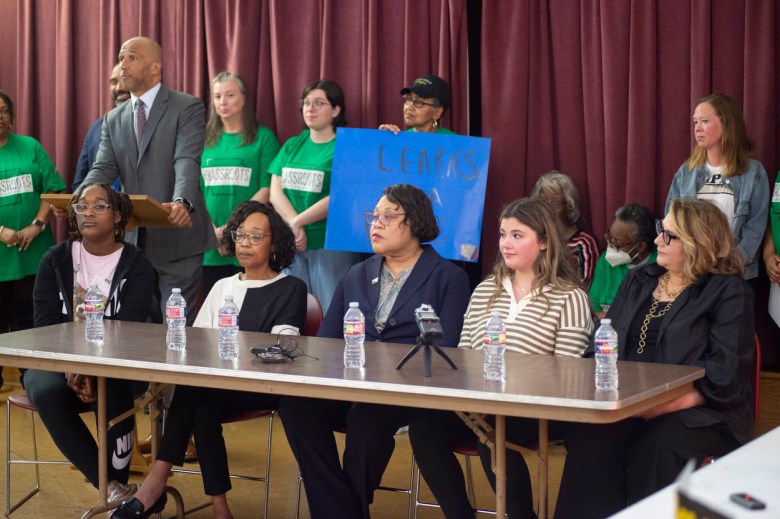A three-judge panel of the 8th Circuit Court of Appeals delivered a win to Gov. Sarah Sanders and other state officials on Wednesday in a federal lawsuit brought by Little Rock Central High teachers, parents and students over an Arkansas law that targets so-called “critical race theory” and bans “indoctrination” in the classroom.
The appeals court vacated
a preliminary injunction issued in May 2024 by a federal judge in Little Rock
. In that ruling, U.S. District Judge Lee Rudofsky said the state couldn’t enforce the anti-indoctrination law as applied to the two teachers who are plaintiffs in the lawsuit, though he stopped short of blocking the law on a statewide basis. The 8th Circuit lifted even that partial injunction Wednesday, saying the plaintiffs ultimately were “not likely to succeed on their free speech claim” on which they challenged the law.
The case has been remanded back to Rudofsky’s court for further proceedings. State officials have filed a motion to dismiss the suit, and
the judge suggested last fall
that he might wait on the 8th Circuit to weigh in on the injunction before ruling on the motion to dismiss.
The “indoctrination” statute was created in 2023 by the Arkansas LEARNS Act, the sweeping K-12 school bill championed by Sanders. The state Department of Education initially cited the law in 2023 when it
stopped offering state credit for a pilot AP African American Studies course
, though education officials later said they made that decision only because the class was in a pilot phase at the time. (AP African American Studies, which is only offered at a handful of Arkansas schools, is again eligible for state credit.)
The plaintiffs in the case are
Central High teachers Ruthie Walls
and
Colton Gilbert
, along with two Central High students, their mothers and the Arkansas State Conference of the NAACP. The lawsuit says the LEARNS law restricts the free speech rights of both teachers and students, as guaranteed by the First Amendment.
Rudofsky, a Trump-appointed judge, gave a partial win to the plaintiffs with his May 2024 injunction. But he said in his order at the time that he felt bound to do so largely because of a decades-old precedent in the 8th Circuit concerning free speech claims in schools, a case called Pratt v. Independent School District No. 831. The plaintiffs in the Arkansas case cited Pratt repeatedly in their lawsuit.
Rudofsky made clear in his order last May that he felt the precedent established by Pratt was outdated in light of multiple U.S. Supreme Court decisions in the decades since, but he was still bound to follow it until the 8th Circuit said otherwise. That appears to have teed up the 8th Circuit’s order on Wednesday.
“The district court here concluded Pratt prevented it from applying the established principles that the Free Speech Clause does not allow an individual to compel the government to provide a particular message,” the appellate court said. “We are not so bound.”
Attorney General Tim Griffin celebrated the appeals court’s decision. Here’s his press release:
This is an important win for the LEARNS Act and for the rule of law. Plaintiffs in this case had sued state officials over the portion of the LEARNS Act that prohibits indoctrination in Critical Race Theory. A lower court issued a preliminary injunction, preventing that portion of the LEARNS Act from being enforced in certain ways. We appealed to the Eighth Circuit, which unanimously overturned the injunction. The appellate court held that prohibiting teachers from providing classroom materials and instruction about Critical Race Theory does not violate the Free Speech Clause of the First Amendment because the government cannot be compelled to provide specific classroom materials. If it were otherwise, school curriculum would effectively be set by litigious actors and the courts. With its ruling today, the Eighth Circuit continues to ensure that the responsibility of setting curriculum is in the hands of democratically elected officials who, by nature, are responsive to voters.
Here’s the full order from the 8th Circuit:
It’s dragon-slaying time!
In a time when critical voices are increasingly silenced, the
Arkansas Times
stands as a beacon of truth, tirelessly defending the fundamental rights and freedoms within our community. With Arkansas at the epicenter of a sweeping culture war affecting our libraries, schools, and public discourse, our mission to deliver unflinching journalism has never been more vital. We’re here to “slay dragons” and hold power accountable, but we can’t do it alone. By contributing today, you ensure that independent journalism not only survives but thrives in Arkansas. Together, we can make a difference — join the fight.







